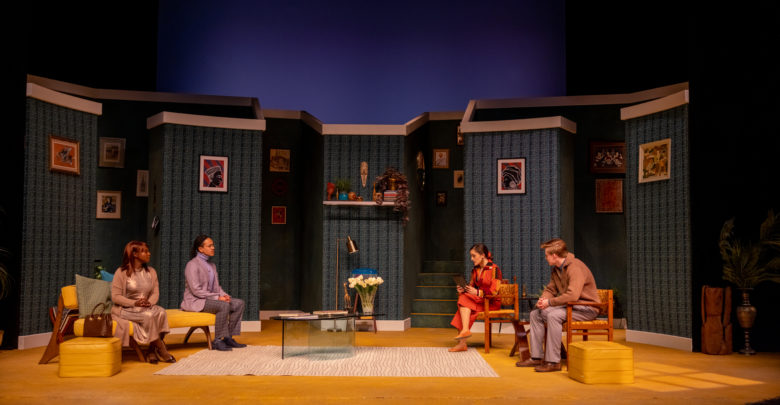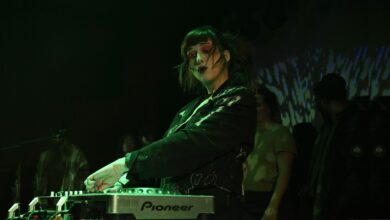‘God of Carnage’ explores relationships and disagreements through comedy
In God of Carnage, two sets of parents meet up after their children have a scuffle, leading to a childish fight between adults.
 DBphotographics
DBphotographicsGod of Carnage is a play that involves the discussion between two sets of parents as they discuss their children’s terrible and unruly behaviour. However, things go south as the parents begin to act like “children” themselves, bringing a great deal of comedy and havoc to the stage.
God of Carnage, written by Yazmina Reza, translated by Christopher Hampton, and directed by Patricia Darbasie, had a set that was very detailed and showcases a sense of home-like comfort. The pictures and paintings that are hung on the set show the interesting art taste that the family hosting the meet-up has. This set displays the unique and specific tastes of the Novak family and how it clashes with the other family, the Raleigh family.
Each character displayed a great amount of emotion throughout the play. Alan Raleigh (Moses Kouyaté) brilliantly expressed his rage, and his chemistry with the rest of the cast was very well-portrayed. Annette Raleigh (Kijo Eunice Gatama) shows her annoyance at the constant work calls that her husband gets. She is sickened by her husband’s work calls, showing physical sickening — even throwing up because of it and the infamous clafouti the Novak family offered her.
Véronique Novak’s (Dayna Lea Hoffmann) dominant and “try-hard” nature is prominent from the start of the play. Finally, we got to see Michael Novak (Sam Free) have the most surprising character transformation around the middle of the play. He went from a timid and obedient husband to a man who doesn’t care about anything and anyone.
It was amazing to watch these four characters undergo these changes bit and bit and how they eventually opened up to one another.
I enjoyed how Micheal Novak changes throughout the play. His chemistry with his wife, Véronique Novak, was rather comic as well; an example is physical comedy, like when she gets drunk and starts whacking his head with a pillow. At the start of the play, he always listens to his wife and does as she says, but he undergoes various changes where he becomes annoyed because his wife and the Raleigh family’s pestering and looking down on him for supposedly “murdering” his daughter’s hamster and making him own up to the deed. As a result, he believes that his marriage is breaking down and hates his children.
It is also rather interesting to watch Micheal’s relationship with Alan Raleigh grow; he initially thinks that Alan is an uptight lawyer who has no manners whatsoever. However, this changes over a bottle of rum that they bond over.
Another aspect that was rather enjoyable was how the audience got to see the bonding of the men versus the women. Like stated before, the men bond over a bottle of excellent rum. Likewise, the ladies bonded over things like the preparation of the clafouti, the flowers that Véronique had set on her coffee table, and even the paintings and the coffee table books that Véronique owned.
It was rather entertaining to see Micheal’s soft side when he spoke to his mother, even though his tone was rather harsh he always ended the conversation by yelling “I LOVE YOU MOM!” into the phone which was a sweet side of him that was rarely seen.
The sound effects were definitely rather intriguing as well. As the play proceeded, the annoying ringtone of Alan’s smartphone kept getting louder and louder. In my opinion, this played a role in the behaviour that his wife unleashed towards the end of the play where she grabbed the phone from his hand and dumped it into the vase. Alan was distraught and burst into tears after shrieking in surprise.
Overall, I think this play was portrayed brilliantly with each aspect of the play tying well together from the engaging actors to the sets, the props, and the sounds.
For more information about the play read here.




